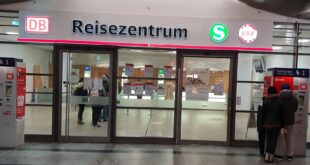In view of the high infection figures and the new coronavirus variant omicron, the federal states are again tightening their coronavirus pandemic containment rules. From 28 December, an upper limit of ten persons, usually aged 14 and over, will be in force in all federal states. This applies, for example, for private meetings at home or in public as well as for vaccinated and recovered persons. If unvaccinated persons are present, a household may meet with a maximum of one or two persons from another household. Here’re the new caps on private meetings and other regulations in detail:
—–
Baden-Württemberg
At meetings attended by at least one unvaccinated person, only one household may meet with two people from another household. Couples who do not live together count as one household. For vaccinated and recovered persons, there is an outdoor limit of 50 persons.
There is a curfew in restaurants from 10:30 pm until 5:00 am. On New Year’s Eve, the curfew does not start until 1:00 am. The new regulation will initially apply until 24 January. FFP2 masks (or comparable masks) must be worn indoors where masks are compulsory.
Bavaria
From Tuesday onwards, only a maximum of ten vaccinated and convalescents will be allowed to meet privately – this applies to private gatherings outside restaurants.
The ban on spectators, which previously applied to large supra-regional sporting events, will in future also apply to large supra-regional cultural events and comparable events.
Berlin
Contact restrictions for vaccinated and recovered people will also apply in the federal capital from 28 December. Cultural or sporting events remain permitted under strict hygiene conditions and with reduced upper limits – 1,000 people outdoors, 200 indoors. Clubs may continue to open, but dancing is prohibited.
Brandenburg
A maximum of ten people at private meetings – this also applies to Brandenburg’s vaccinated and convalescent population from Monday (27 December). Other tightening measures remain in force. These include the nightly curfew for unvaccinated people in hotspot regions. Outdoor demonstrations are subject to an upper limit of 1,000 participants plus mandatory masks and a minimum distance. On New Year’s Eve, gatherings are prohibited, and a ban on firecrackers applies to crowded places.
Bremen
In the smallest federal state, clubs and discos are closed from Christmas Eve, dance events are prohibited. 2G applies in retail and catering, culture and sports. Restrictions on contact for the unvaccinated continue – a household may only meet with two other people from other households.
From 28 December, as in the other provinces, private meetings for all recovered and vaccinated people will be limited to ten people.
Hamburg
Large events must take place without an audience. A closing hour from 23.00 hrs applies to the catering trade. Only on New Year’s Eve may restaurants, bars and pubs remain open until 01.00 on New Year’s morning. Standing tables in restaurants may no longer be used.
In addition, there is a ban on dancing, which in effect amounts to the closure of clubs and discos.
Hesse
In Hesse, less strict contact restrictions apply: From 28 December, only groups of a maximum of ten people are allowed to meet in public. If unvaccinated people are present, the following applies: one household plus a maximum of two people from another household.
The operation of dance halls is banned throughout the state. The upper limit for all indoor or outdoor events in Hesse will be 250 participants from Tuesday onwards.
Mecklenburg-Western Pomerania
In the north-east, the tightened contact restrictions are already in effect from Christmas Eve. Clubs and discos have been closed for some time. On 27 December, cinemas, theatres, museums, swimming pools or other leisure facilities throughout the state will also have to close because the state’s own Corona traffic light has been on red for several days.
Lower Saxony
The tightened contact restrictions decided by the federal and state governments take effect in Lower Saxony from 27 December. However, the state had already imposed a so-called Christmas rest, which is to last at least until 15 January. Clubs must close as early as Christmas Eve, events with more than 500 people are banned. A maximum of 25 vaccinated or recovered people are allowed to meet at Christmas – children are also included.
For the unvaccinated, the rules are stricter: a household may only meet with two people from another household.
North Rhine-Westphalia
Clubs and discos are closed, public and private dance and disco parties are prohibited. Large events are now only permitted without spectators. Other events may have a maximum of 750 spectators. There will be no large New Year’s Eve parties. At the turn of the year, gatherings of more than ten people in public squares and streets are prohibited.
For indoor sports and wellness, vaccinated and recovered persons need a negative rapid test (2G plus).
Rhineland-Palatinate
Empty spectator stands are compulsory for national sporting, cultural and other major events such as the Bundesliga. Clubs and discotheques are closed. 2G plus applies to restaurants, hairdressers and other indoor areas where the mask cannot be worn all the time. Here, a booster vaccination replaces the negative rapid test.
Saarland
The regulation that unvaccinated persons may come together with persons from their own household and a maximum of two persons from another household already applies in Saarland. Previously, a maximum of one person from another household was allowed to join them. Universities must allow students to attend courses in digital form if they cannot provide proof of 2G (vaccinated or recovered).
Saxony
The Free State of Saxony has adapted its emergency ordinance. In Saxony, however, contact restrictions have been in place since 19 November due to high infection rates, as other states are only now introducing.
On 28 December, some tightening measures will come into force, including the obligation to wear FFP2 masks in closed public facilities and at services close to the body. Funerals may be attended by a maximum of 20 people with 3G proof. The night-time curfew for particularly affected Corona hotspots, in place since November, will continue.
Saxony-Anhalt
Since 23 December, clubs and discos are no longer allowed to open in Saxony-Anhalt. Because the state parliament has determined that the situation is epidemic, the counties and independent cities have the option of imposing further measures.
For those who have been vaccinated and those who have recovered, there are no contact restrictions – for the time being. The recommendation in Saxony-Anhalt remains, not to meet with more than ten people. Minister President Reiner Haseloff, however, did not rule out the possibility of further action in the coming days.
Schleswig-Holstein
Despite relatively low coronavirus infection figures, the contact restrictions agreed in the federal-state meeting are also to apply in the state from 28 December.
There are also plans to significantly reduce the possible capacities of clubs and discos under the already valid 2G-plus rules, where a negative Corona test must be shown in addition to proof of vaccination or convalescence.
Thuringia
Children up to the age of twelve years and three months are left out of the count when it comes to contact restrictions. Clubs and discos have been closed for some time. Public festivals, Christmas markets or fairs are also prohibited. New Year’s Eve events in public spaces are prohibited. No fireworks may be carried or set off there either.
There will be no classes at Thuringian schools on the first two days after the holidays (3 and 4 January). Distance learning will then take place until 14 January.
Sola Jolaoso with agency reports
 THE AFRICAN COURIER. Reporting Africa and its Diaspora! The African Courier is an international magazine published in Germany to report on Africa and the Diaspora African experience. The first issue of the bimonthly magazine appeared on the newsstands on 15 February 1998. The African Courier is a communication forum for European-African political, economic and cultural exchanges, and a voice for Africa in Europe.
THE AFRICAN COURIER. Reporting Africa and its Diaspora! The African Courier is an international magazine published in Germany to report on Africa and the Diaspora African experience. The first issue of the bimonthly magazine appeared on the newsstands on 15 February 1998. The African Courier is a communication forum for European-African political, economic and cultural exchanges, and a voice for Africa in Europe.

































